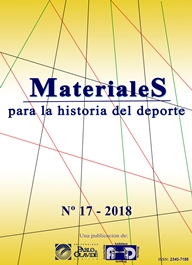Sports policies under the Batista regime (1952-1958). Cuban particularities and similarities with francoist Spain
Keywords:
Batista, Franco, dictatorship, sports, Cuba.Abstract
During the dictatorship of General Fulgencio Batista, which started in 1952, Cuba encountered a permanent political crisis, where terror acts of the regime alternated with armed actions of its enemies, with Fidel Castro in the front line. The sports field was marked by many signs of social injustice as well as of the more and more generalized corruption. Sports policy, for its part, reflected in a more common manner the logics of a dictatorship. Indeed, Batista tried to held the sports associations under State control, relying both on the Comisión nacional de Deporte whose director was his brother in law and on a new Olympic Committee whose members he wanted to appoint himself. Apart from these authoritarian tendencies, the weakness of international results as well as the compensatory function of spectator sport can be considered as elements of similarity in comparison with the development of sports in Francoist Spain. The analysis of the functions and the factors of malfunction of Cuban sports under Batista is based on numerous archive documents (from the Cuban National Archives and the Avery Brundage Collection), on official government publications and on the two biggest Cuban weekly newspapers of the 1950s.
Downloads
References
ACKERMANN, Jörg Fußball und Nationale Identitäten in Diktaturen. Spanien, Portugal, Brasilien und Argentinien, Zurich, LIT Verlag, 20013.
ARGOTE-FREYRE, Frank. Fulgencio Batista. From revolutionary to strongman, New Brunswick, Rutgers Univ. Press, 2006.
ASCUNCE ARRIETA, José Ángel. Sociología cultural del franquismo (1936-1975). La cultura del nacional-catolicismo, Biblioteca Nueva, Madrid, 2015.
BALL, Phil. Morbo: la historia del fútbol español, T&B Editores, Madrid, 2010, p. 112.
BORGES, Milo A., Compilación ordenada y completa de la legislación cubana de 1899 à 1950, secunda edición, Editorial Lex, La Habana, 1952, vol. 2.
CIRULES, Enrique. El imperio de La Habana: la mafia en Cuba, La Habana, Ediciones Casa de las Américas, 1993.
CLUSTER, Dick y HERNÁNDEZ, Rafael. History of Havana, Palgrave MacMillan, New York, 2006, capítulo “City Lights: The Fabulous fifties”, p. 189-202.
COLHOUN, Jack. Gangsterismo. The United States, Cuba, And the Mafia: 1933-1966. OR Books, New York/London, 2013.
ENGLISH, T. J., Havana nocturne: How the Mob Owned Cuba and Than lost It to the Revolution, Harper Collins Publishers, New York, 2008FERNÁNDEZ MIRANDA Roberto. Mis relaciones con el general Batista, Miami, Ediciones Universal, 1999.
FIGUEREDO CABRERA, Katia. “Carlos Prío Socarrás, Fulgencio Batista, Francisco Franco: la escalada hacia una consolidación ‘fraterna’ (1948-1958)”, en Illes Imperis 12 (2009), p. 49-71.
GONZÁLEZ AJA, Teresa. “La política deportiva en España durante la República y el franquismo”, en Teresa
GONZÁLEZ AJA y Pierre ARNAUD (dir.), Deporte y autoritarismos: la utilización del deporte por el comunismo y el fascismo, Madrid, Alianza Editorial, 2002, p. 169-202.
GOUNOT, André. “Les transformations socialistes du système sportif à Cuba au début des années 1960 – une reproduction du modèle est-européen?”, en Actes des 16e e Carrefours d’histoire du sport (“Le Sport et les sixties”), Lyon, 27-29 octobre 2014, Reims, Presses Universitaires de Reims, 2016, p. 209-221.
GONZALÉZ ECHEVARRÍA, Roberto. The Pride of Havana. A History of Cuban Baseball, New York/Oxford, Oxford University Presse, 1999.
KAISER, David. The Road to Dallas. The Assassination of John F. Kennedy, Cambridge-Londres, Harvard University Press, 2009.
KOCKA, Jürgen. “Probleme einer europäischen Geschichte in komparativer Absicht”, en idem, Geschichte und Aufklärung, Göttingen, Vandenhoeck & Ruprecht, 1989.
MANRIQUE, Juan Carlos. “Juventud, deporte y falangismo. El Frente de Juventudes, la Sección Femenina y los deportistas del Movimiento”, en Xavier PUJADAS Y MARTÍ (coord.), Atletas y ciudadanos. Historia social del dceporte en España: 1870-2010, p. 233-272. NIELFA CRISTOBAL, Gloria. Mujeres y hombres en la Españna franquista: sociedad, economía, política, cultura, Madrid, Universidad Complutense, 2003.
PÉREZ DE PEÑAMIL, Santiago Prado. “Balompié: alternativa simbólica de los españoles en La Habana (1898-1935)”, en Temas. Cultura, ideología, sociedad, núm. 49, enero-marzo 2007, p. 46-54.
PUJADAS, Xavier (dir.). Atletas y ciudadanos. Historia social del deporte en España (1870-2010). Madrid, Alianza Editorial, 2011.
REINHARD, Kai y KRÜGER, Michael. “Funktionen des Sports im modernen Staat und in der modernen Diktatur”, en Historical Social Research. Historische Sozialforschung, vol. 32, 2007, núm. 1, p. 43.
RIDER, Toby C. “From Resistance to Revolution. The Struggle for Control of the Cuban Olympic Committee, 1953-1964”, en Olympika: The International Journal of Sports Studies 18 (2009), p. 57-97.
RIGOULOT Pierre. Coucher de soleil sur La Havane. La Cuba de Castro 1959-2007, Paris, Flammarion, 2007, p. 478.
RIVAYA GARCÍA, Benjamín. “Filosofía, deporte y franquismo”, en El Basilisco 19, 1995, p. 67-76.
SALES BORRÁS, Estefanía y AÑÓ, Vicente. “El deporte en Segorbe después de la Guerra Civil a través de las Organizaciones Juveniles Españolas”, en Materiales para la Historia del Deporte, núm. 15, 2017, p. 57-78.
SEERS, Dudley. Cuba: The Economic and Social Revolution, Chapel Hill, University of North Carolina Press, 1964.
TEICHLER, Hans Joachim. “Die faschistische Epoche des IOC“, en Historical Social Research. Historische Sozialforschung 32, 2007, núm. 1, p. 24-42.
TUSSELL, Javier. La dictadura de Franco, tomo 3 de la Historia de Espana en el siglo XX, Madrid, taurusminor, 2007 (segunda edición).
VALDÉS SÁNCHEZ, Servando. “El deporte en la cultura de las élites militares: 1952 – 1958”, en La Jiribilla (online), núm. 190, 2004.
VIUDA-SERRANO, Alex. “A Diplomatic Mission: Spain and the 1948 London Olympics”, en The International Journal of the History of Sport, vol. 27, 2010, núm. 6, p. 1080-1103.
ZEUSKE Michael. Insel der Extreme. Kuba im 20. Jahrhundert, Zürich, Rotpunktverlag, 2004, p. 162- 163.
Downloads
Published
Issue
Section
License
Authors who submit to this journal agree to the following terms:
- Author(s) keep copyright and guarantee to the journal the right to be the first publication of the work as licensed under Creative Commons Attribution-Noncommercial-ShareAlike 4.0 International as initial publication in this journal.
- Author(s) can establish additional agreements for non-exclusive distribution of the version of the work published in the journal (for example, to an institutional archives or to publish it in a book), with an acknowledgment of its initial publication in this journal.
- It is allowed and authors are encouraged to disseminate their work electronically (e.g, in institutional open archives or on their own website) before and during the submission process, as it can lead to productive exchanges, as well as a citation earlier and more of published work (See the Effect of Open Access).












